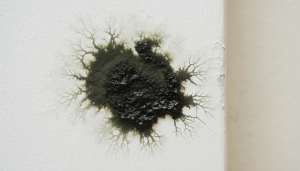Water heater leaks and mold, a costly pair you can avoid, lead to significant issues that can be prevented with simple steps. Leaks cause water damage and mold growth, driving up repair costs. This guide shows you how to maintain your water heater to avoid leaks and mold.
Key Takeaways
Water heater leaks are often caused by loose fittings, faulty drain valves, and sediment buildup, leading to expensive repairs and potential mold growth.
Mold from water heater leaks poses serious health risks and structural damage, making it crucial to maintain low indoor humidity and address leaks promptly.
Regular maintenance, including inspecting connections and flushing the tank, can prevent leaks and extend the life of your water heater, saving you money in the long run.
Understanding Water Heater Leaks
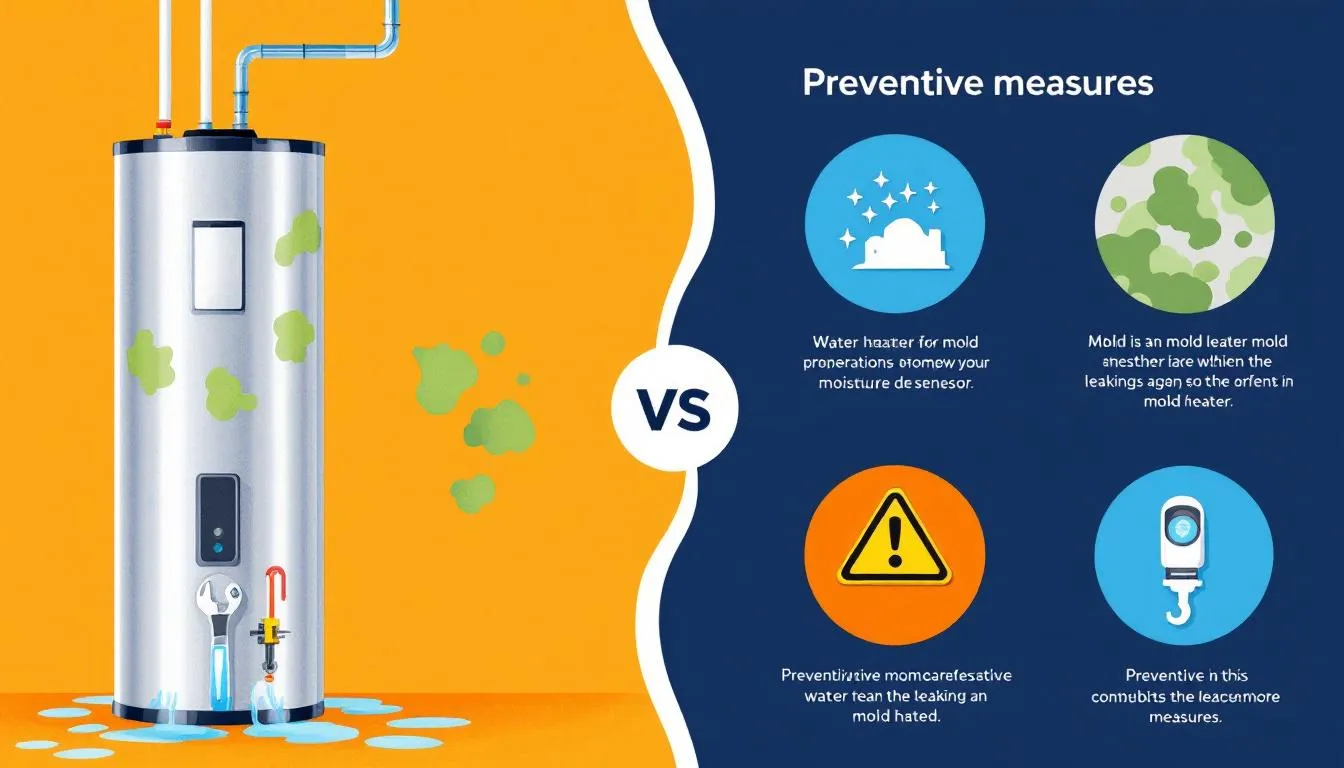
Water heater leaks can be a homeowner’s nightmare, leading to water damage, mold growth, and costly repairs. Common causes of water heater leaks include excessive pressure, malfunctioning valves, and sediment buildup in the tank. High water temperature or pressure can force water out through weak points in the heater, leading to leaks in areas such as the drain valve, T&P valve, connections, and the tank itself.
Internal tank leaks are often caused by age and deterioration of the unit. As water heaters age, the internal components can corrode and weaken, making them more susceptible to leaks. If a water heater leak is not addressed promptly, it can result in significant water damage, higher water bills, and potential mold growth.
Visible signs of a leaking water heater include puddles around the heater, soggy drywall, and spots on ceilings. Regular maintenance helps to identify potential leaks early and prevents significant damage to your home. Identifying the source of a leak allows for targeted repairs, saving time and money.
Here are some specific causes of water heater leaks and how to address them.
Loose Fittings
Connections for the inlet and outlet of a water heater can loosen over time, potentially causing a water leak. Loose fittings are a major cause of water heater leaks that can lead to significant water damage, especially if the pipes are not properly maintained.
Checking and tightening these connections can prevent leaks and extend the lifespan of your water heater. Inspect your water heater’s fittings at least annually and address any looseness immediately to avoid costly repairs and water damage.
Faulty Drain Valve
A drain valve can develop leaks if it becomes loose or fails to create a watertight seal. This can lead to slow leaks in a water heater, which may worsen over time and cause excessive water loss. If you see a leaking drain valve, address it by using a pipe wrench to carefully tighten the valve.
Homeowners should seek advice from a professional plumber before attempting to replace the drain valve themselves. Installing a new drain valve may be necessary if the existing one is leaking.
Sediment Buildup
Sediment buildup occurs when minerals in the water settle at the bottom of the water heater tank. This buildup can lead to:
Overheating
Cracks in the tank’s lining, resulting in leaks
Reduced efficiency
Potential leaks
Complete failure of the water heater
Leaks become inevitable when corrosion reaches the outer layer of the water heater tank. This progression highlights the importance of regular maintenance. Regular cleaning and flushing of the water heater tank can help prevent sediment buildup and extend the unit’s lifespan.
The Dangers of Mold Growth

Mold growth can occur from water heater leaks, leading to significant problems:
Water damage from a leaking water heater can cause structural issues and attract mold.
Mold exposure can lead to health risks such as respiratory issues and allergic reactions.
Maintaining indoor humidity below 60% is crucial to reducing mold risk.
Let’s delve into the specific health hazards and structural damage caused by mold growth.
Health Hazards
Mold exposure can result in serious respiratory issues and aggravate allergies. Exposure to mold can lead to respiratory issues, skin irritation, and may worsen asthma symptoms.
Mold can trigger asthma and worsen respiratory conditions, posing a significant risk to the health of everyone in the house.
Structural Damage
Mold growth often occurs in areas that experience water leaks, especially around water heaters. Left untreated, mold can lead to significant structural damage to walls, floors, and utility closets, severely impacting the integrity of the home.
This further damage can result in costly repairs and extensive renovations to restore the affected areas.
Steps to Prevent Water Heater Leaks
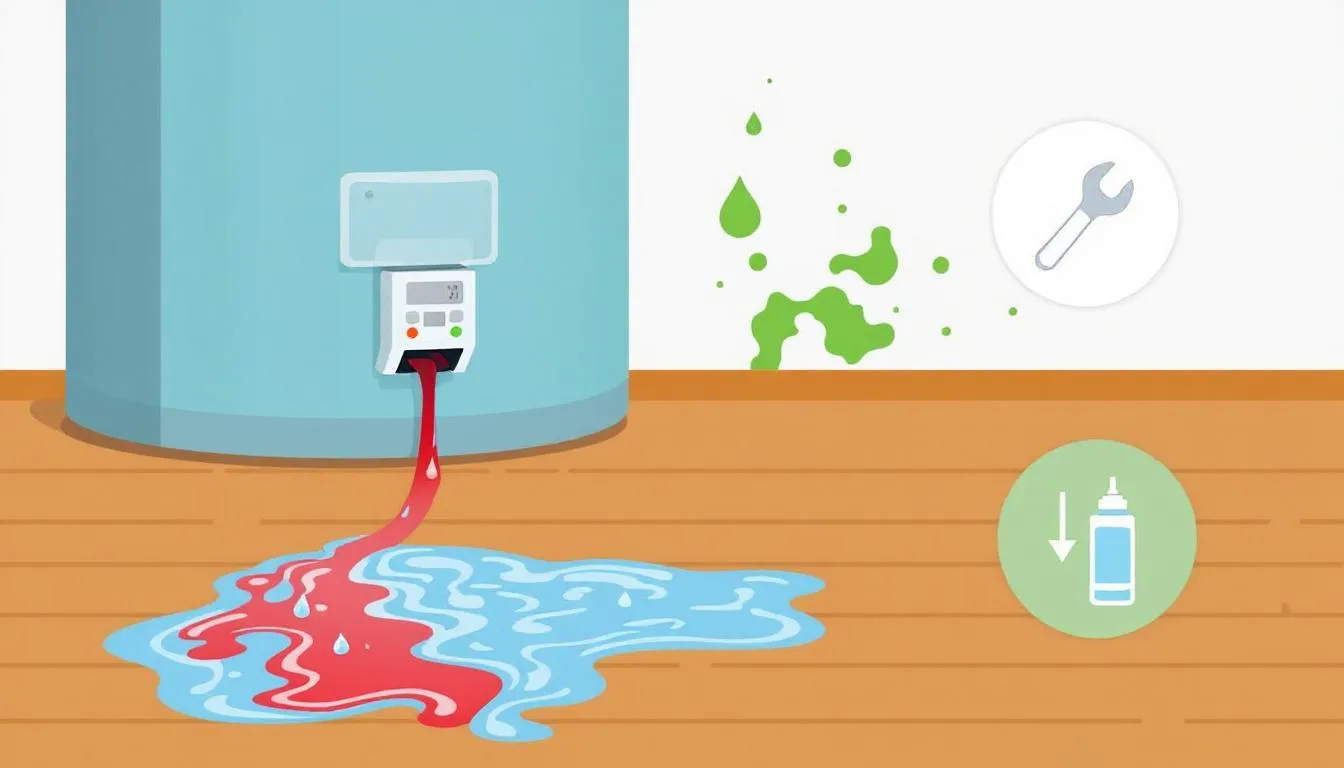
Regular maintenance is crucial as it helps avoid costly damage and extends the life of your water heater. Accumulation of sediment in the tank can lead to overheating, which stresses the tank’s lining and results in cracks. Replace the anode rod every 2 to 3 years to prevent corrosion and ensure optimal functionality.
Some new hot water heater models offer warranties of up to 12 years, indicating their longevity with proper care. Here are specific steps to prevent water heater leaks.
Regular Maintenance
Maintenance checks help catch minor issues before they become major problems. The average lifespan of a water heater is 8 to 12 years, and regular maintenance can prolong its life. Sediment build-up in a water heater can cause the unit to overheat and eventually fail.
Check and maintain your water heater regularly check to save money and ensure optimal performance.
Inspecting and Replacing Anode Rod
Rusty or discolored hot water is a clear sign that the anode rod is failing. Water heater tanks corrode due to aging, loss of anode rod effectiveness, and wear of protective glass lining. Leaks caused by the anode rod can be resolved with a quick replacement of the rod.
The anode rod does not have a longer life expectancy than the water heater tank, so regular inspection and timely replacement are essential.
Flushing the Tank
Regularly flushing the water heater tank helps remove sediment buildup, preventing overheating and leaks. Drain the water heater every six months to effectively remove sediment. Strange noises from the water heater can indicate sediment buildup, leading to performance issues.
Low water pressure from the hot water faucet may signal sediment buildup in the hot water heater caused by hard water. Regular flushing ensures the efficient functioning of the water heater and prevents leaks, especially when dealing with high water pressure.
Immediate Actions After Detecting a Leak
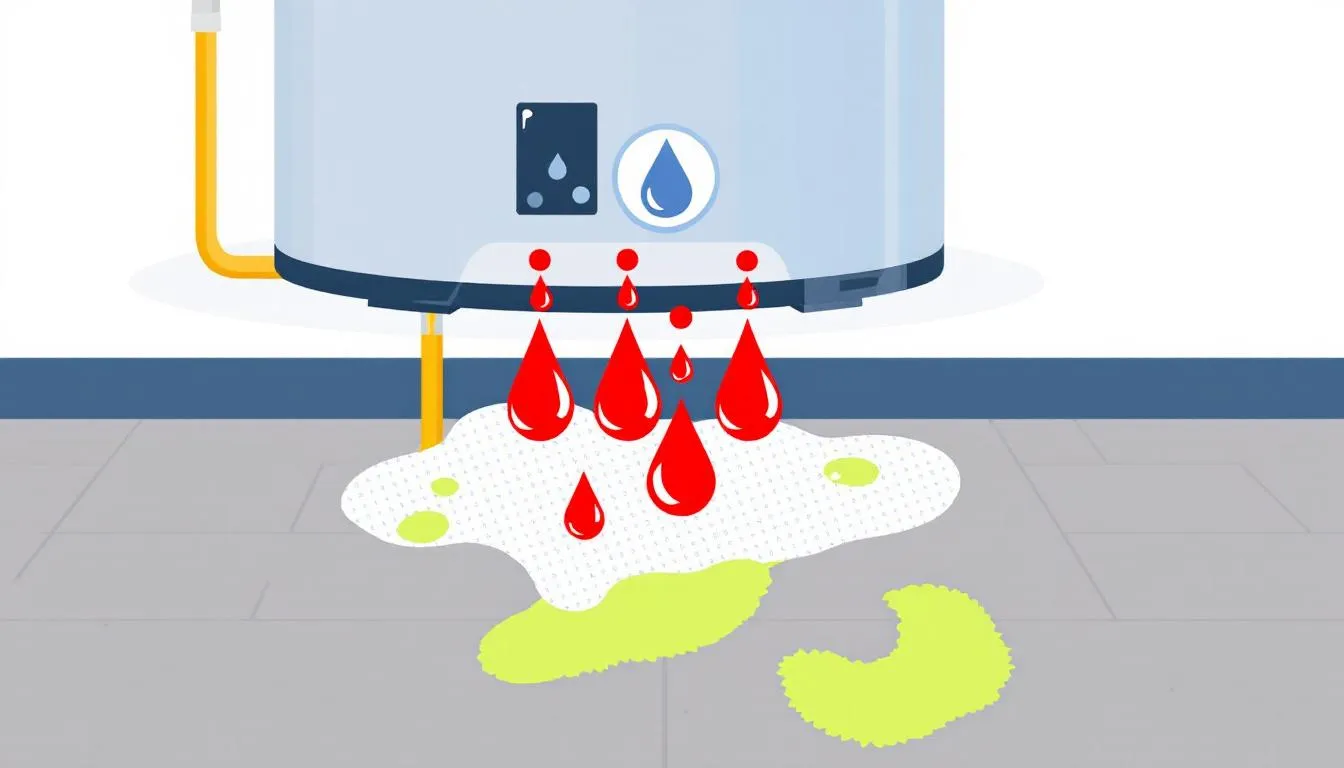
If you detect a water heater leak, immediate action is crucial to prevent further damage. Turn off the water supply and power to the heater to stop the flow of water and ensure safety. Mold and mildew can develop quickly after a water heater leak, leading to increased repair costs.
Here’s what you should do right away on your website.
Shut Off Water Supply
When a water heater is leaking, first turn off the water supply. Shut off the hot water supply valve connected to the water heater and the cold water supply. This will help prevent further leaks and damage.
The shutoff valve is typically located on the water supply line of the water heater. Additionally, for severe leaks, turning off the main water supply may be necessary to stop the flow. If possible, tighten any loose connections to help mitigate the leak.
Turn Off Power Supply
First determine if your water heater is electric or gas. For electric water heaters, turn off the dedicated breaker before servicing. For gas units, shut off the supply valve when repair is needed.
This step is essential to prevent potential hazards and ensure a safe space environment for repairs and to fix any issues that may arise during the test.
Remove Standing Water
A wet/dry vacuum is effective for removing significant amounts of standing water and helps dry the area faster to minimize moisture retention, preventing draining issues.
Removing standing water promptly is crucial for preventing mold and mildew growth. Neglecting to remove standing water can lead to serious mold issues that jeopardize both health and property.
Professional Help for Water Heater Leaks and Mold Remediation
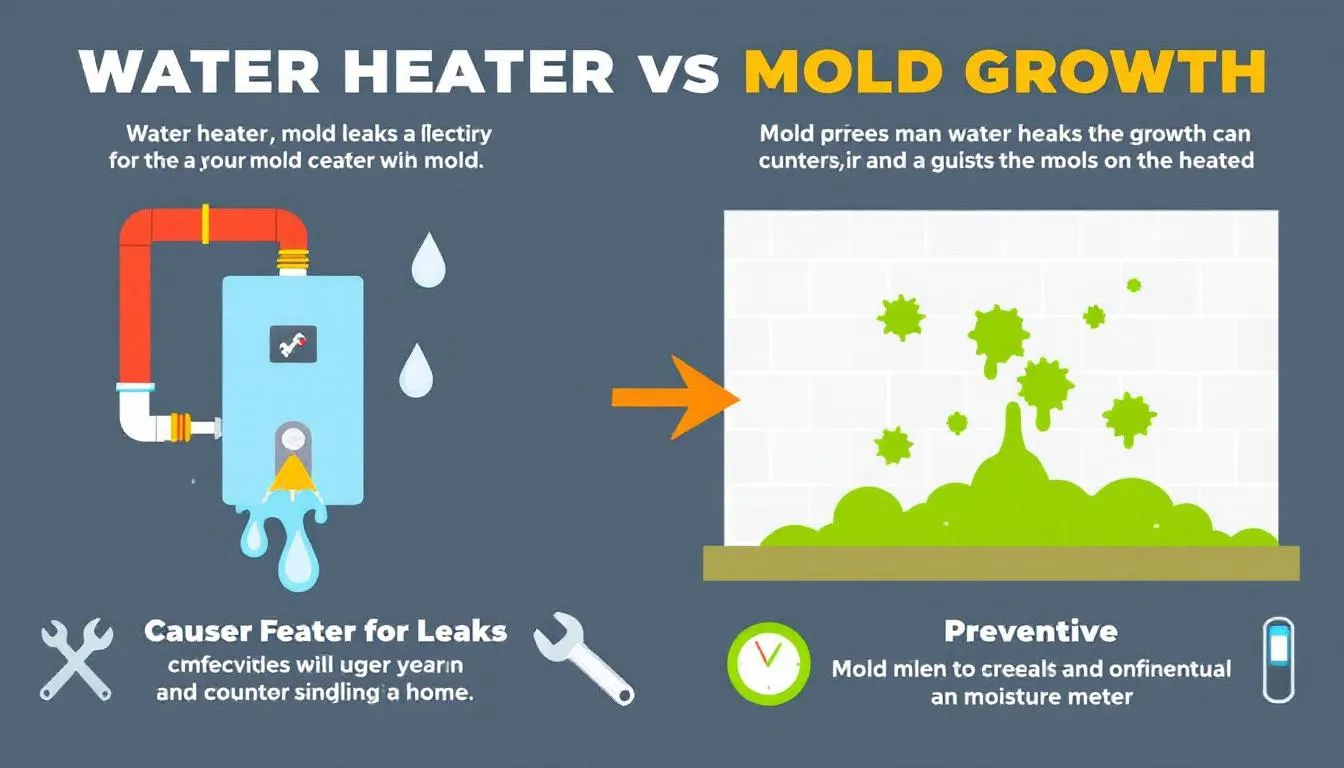
Engaging experts for repairs helps ensure the safety and efficiency of water heating systems. If you notice a leak from your hot water tank, call expert plumbers for inspection and repair. Prolonged mold growth can weaken the structural components of your home, leading to expensive heat repairs.
Addressing leaks and mold promptly with professional help can prevent further damage and ensure a safe lives environment.
When to Call a Plumber
Immediate assistance from a plumber is crucial when there’s a leak to mitigate further damage. If you think your water heater may be failing, seek advice from an expert.
A plumber can provide the necessary plumbing repairs and ensure that your water heater is functioning optimally, preventing future issues.
Mold Remediation Services
Professional mold remediation ensures thorough removal and safety for your home. Certified specialists can locate and safely remove hidden mold.
Professional water extraction is recommended to handle large spills around the water heater safely. Seeking professional help is vital to prevent future mold growth in your home.
Preventing Future Mold Growth
Keeping the area around the water heater clean and dry discourages mold formation. Mold specialists use advanced techniques to identify and eliminate mold sources effectively, ensuring safe removal without health risks.
Implementing preventative measures can help maintain a mold-free environment in your home.
Ensure Proper Ventilation
Improving airflow significantly decreases moisture accumulation and condensation, preventing mold growth. To decrease humidity levels and prevent mold growth:
Use exhaust fans in moisture-prone areas.
Open windows in moisture-prone areas.
Ensure proper ventilation in utility closets and other susceptible areas.
Use Dehumidifiers
Dehumidifiers effectively control indoor moisture and prevent mold development. Use them in areas with high humidity to inhibit mold growth.
Utilizing a dehumidifier can effectively manage humidity in spaces prone to dampness, thus preventing mold growth.
Warning Signs of Water Heater Issues
Watch for warning signs of water heater issues to prevent costly repairs and ensure safety. Older tanks can be more vulnerable to leaks due to rust-induced internal corrosion. Frequent repairs or maintenance may signal the need for a replacement. Identifying signs such as dampness, moisture, and mineral deposits can help catch leaks early.
Taking immediate action upon noticing these signs generally can prevent more extensive damage and costly repairs.
Strange Noises
Popping, banging, or rumbling sounds can indicate water heater problems, often signaling sediment accumulation. Strange noises may signal underlying issues that could lead to leaks.
Addressing strange noises promptly can prevent further damage, including leaks from the water heater.
Discolored Water
Discolored or rusty water signals potential problems with your water heater, often indicating a failing anode rod and internal corrosion. If not addressed, it can lead to leaks, compromising the water heater’s efficiency and stability.
Regular maintenance checks can help identify issues early, preventing discolored water and potential leaks from emerging.
Summary
Preventing water heater leaks and mold growth saves you from costly repairs and health risks. Regular maintenance, inspecting and replacing the anode rod, and flushing the tank are crucial steps. Taking immediate action when detecting a leak and seeking professional help can mitigate further damage. Ensuring proper ventilation and using dehumidifiers help prevent future mold growth. Stay vigilant for warning signs like strange noises and discolored water. By following these guidelines, you can keep your home safe, dry, and mold-free.
Frequently Asked Questions
What are the common causes of water heater leaks?
Water heater leaks often happen due to excessive pressure, faulty valves, or sediment buildup. It’s a good idea to keep an eye on these issues to prevent bigger problems down the line.
How can mold growth from water heater leaks affect health?
Mold from water heater leaks can seriously impact your health, causing respiratory problems, skin irritation, and even aggravating asthma. It’s important to address leaks promptly to prevent these health risks.
What steps should be taken immediately after detecting a water heater leak?
As soon as you notice a water heater leak, turn off the water and power supply right away, then remove any standing water to avoid more damage and mold. Taking these steps quickly can save you a lot of headaches later on!
When should a professional plumber be called for water heater issues?
If you notice a leak or suspect your water heater is failing, it’s best to call a plumber right away. Don’t wait—getting help early can prevent bigger problems down the line.
How can future mold growth be prevented?
To prevent future mold growth, make sure to ventilate spaces well, use dehumidifiers, and keep areas like around your water heater clean and dry. These steps will help keep moisture at bay and protect your home.


